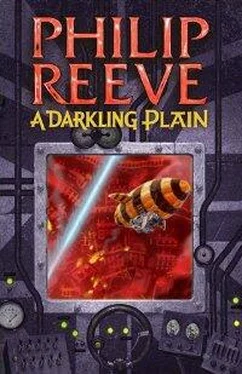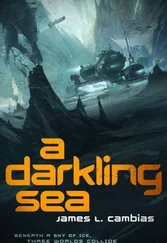By the time Wren kissed Theo in the ruins of London, Manchester was shoving its way through mile upon mile of lately planted forest toward the static settlement Called Forward Command. Around it swooped the Flying Ferrets, strafing Mossie rocket nests. The armored suburbs of Werewolf and Evercreech raced ahead of their mother city like well-trained dogs.
A flight of Fox Spirits rose from somewhere in the Mossie citadel and tore toward Manchester. Orla Twombley signaled the rest of her squadron, and the Ferrets pulled together, rising in a howling flock toward the ships, which broke right and left, scattering air-to-air rockets. Orla cursed as a machine on her starboard wing (the wicker gyrocopter Big Blue Plymouth) ran into an oncoming rocket and blew apart, blinding her with its smoke. She got onto the tail of the Fox Spirit that had fired the rocket and chased it westward, tearing chunks out of its steering vanes with the Combat Wombat’s cannon. She stitched incendiary bullets along its flank and watched as the gas cells started to burn. White escape balloons blossomed around the gondola as the crew bailed out. Some aviators regarded escape balloons as good target practice, but Orla had always insisted that the Ferrets shoot down ships, not people, so she swung around the collapsing airship and started back to help her comrades deal with the rest.
She was about three miles from Manchester when the sky split open. There was a shriek and a roar. Struggling to keep the Wombat’s nose up as it dropped toward the ground, she watched a lance of white fire lean across the sky. The Wombat’s canvas wings began to smolder. Orla called on various gods and goddesses, and trained her fire extinguisher on the burning patches. The sky was filled with smoke and light. She thought she saw the fire lance sweep northward, swerving toward one of Manchester’s suburbs. As it moved away and the shrieking, roaring sound faded, she realized that the Wombat’s engines had failed, and she could not restart them.
Surfing on the thermals above the burning forests, she turned toward Manchester, but Manchester was motionless, its armor holed, its tracks destroyed, tier upon ruined tier leaking flame into the scorched sky. Orla had never imagined that there could be so much fire in the world. She circled the carcass once, weeping, aghast at the thought of so many dead and dying. There was nothing she could do to help them. She steered northwest, searching for somewhere to set down. The light in the sky had gone out, but it had drawn a sweeping line of brush fires across the plains, and at points along the line great pyres were burning where suburbs and cities had stood.
At last, as the Combat Wombat began to lose height in the cooler air, an armored city loomed ahead. It was Murnau, motionless but whole, and its lookouts recognized Orla’s machine and opened a portal in the top-tier armor to let her inside. As the Wombat touched down on Über den Linden, she felt the wheels buckle, and then the whole undercarriage gave way; she slewed to a standstill in a storm of splintering wood and snapped string, a flapping of seared canvas. She hadn’t realized how badly the poor old kite had been burned.
Hadn’t realized how badly she’d been burned until she saw the men who ran to help her staring. Her pink flying suit was charred black; her face black too, except for the patches around her eyes where her goggles had protected her.
Smoke trailed from her gauntlets as she waved the medical crew aside and staggered coughing toward the Rathaus. She had to tell someone what she had seen; for all she knew, she was the only one who had escaped alive. “I must see the kriegsmarschall …,” she spluttered.
Von Kobold met her on the Rathaus steps. “Ms. Twombley? That light—those fires—We have lost contact with Manchester, Breslau, Moloch-Maschinenstadt… What the devil is going on out there?”
“Manchester’s gone,” said Orla Twombley. She collapsed, and von Kobold caught her, smudging his white tunic with soot and blood. “They’re all gone,” she said. “Turn your city about. Retreat! Run! The Storm have a new weapon, and it destroys everything…”
“A messenger, sir! A messenger from the front!”
The voice of Naga’s aide booms and echoes around the inside of the war room in the Jade Pagoda, echoes and booms around the inside of the general’s head. He can’t imagine what the man is so excited about. All week long there have been nothing but messengers from the front, and they have brought nothing but bad news. Naga isn’t even certain where the front is any longer. Whatever luck he had has deserted him. Maybe it died with Oenone.
“General Naga!”
Well, here he is, this famous messenger, and nothing much to look at: a moon-faced subofficer from one of the listening posts in the western mountains. “Well?”
The boy bows so low that pencils shower out of his tunic pockets and rattle on the floor. “A thousand apologies, General Naga. I had to come in person. All our Stalker-birds have been reassigned to the front, and there is something interfering with radio signals—”
“What is it?” barks Naga. At least, he tries to bark it; it comes out as a tetchy sigh.
“The Lady Naga, sir!” (How bright his eyes are, this boy. Was he even born when the wars began?) “She is alive, sir! A Stalker-bird came in from General Xao’s division. It was badly damaged, but we deciphered the message. Lady Naga is on her way home.”
The boy, who seemed so porridge featured and uninteresting a few moments ago, is actually remarkably handsome; brave; intelligent. What is the Storm thinking of, making a young man of his caliber carry messages for outlandish listening posts? Naga lurches to his feet and lets his armor carry him toward the map table. “Promote this man to lieutenant. No, captain.” He feels almost young again. Oenone is alive! A hundred new strategies bloom in his head like paper flowers dropped into water. Surely one of them will halt the townie advance?
She is alive! She is alive! She is alive!
He is so overjoyed that it is almost a whole minute before he stops to wonder about the young woman who came to him out of the desert with such graphic stories of Oenone’s death.
He snatches a sword from one of his generals. Officers and Stalkers scatter before him as his armor marches him out of the war room, up the stairs. “General Naga, sir?” shouts one of the men behind him.
“The girl Rohini, you fool!” he yells—or tries to yell. (The truth is starting to dawn: What has she done to me?) “Fetch the guard!” But he doesn’t really want the guard to deal with her; he wants to deal with her himself, with this good sword; he wants to split her head like a melon.
He doesn’t bother knocking when he reaches the door of her chamber, way out in the western wing. His armor carries him through it, and shards and splinters of antique wood rattle off him as he climbs the five stairs to her living space. She is rising from her seat to greet him as he reaches the top step, lovely and demure as ever, a big window behind her opening onto a moonlit balcony.
“My wife is alive,” says Naga. “She is flying home. Are you going to keep up the mute act, or do you have any final words?”
For a moment she stares at him, hurt, frightened, confused. Then realizing it just won’t wash anymore, she laughs. “You old fool! I’m glad she’s alive. Now she’ll see where her peace has brought us! To the edge of destruction! Not even you will listen to her Tractionist lies now.”
“What do you mean?”
“You still don’t understand?” Rohini laughs again, a little wildly. “She’s working for them! She’s always been working for them! Why do you think she married you? You’re not exactly the answer to a young girl’s dream, Naga. Half a man, wrapped up in clanking armor. Not even that, soon. I’m going to kill you, general, and your people will rise up and kill your traitor wife. Then they will be ready to welcome their real leader back, when she reveals herself.”
Читать дальше












